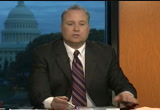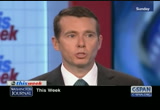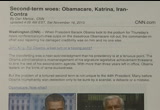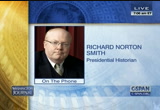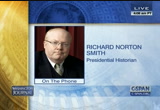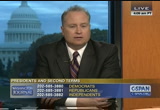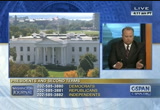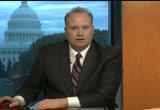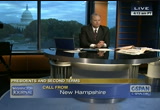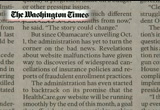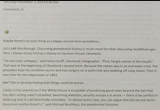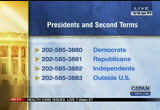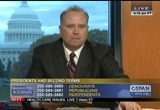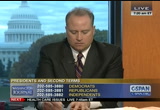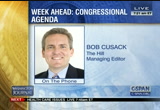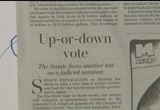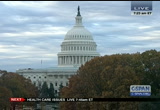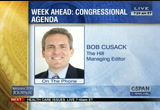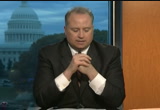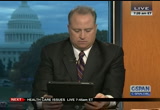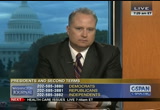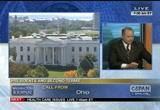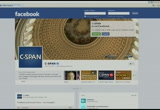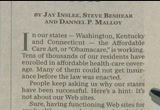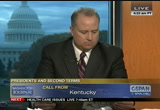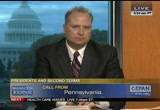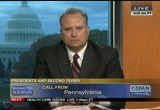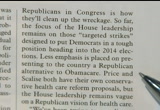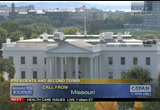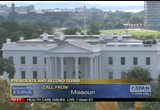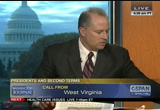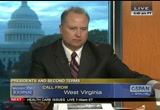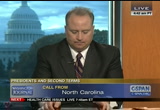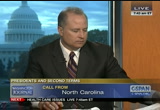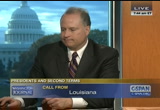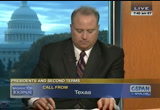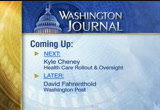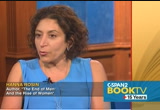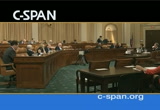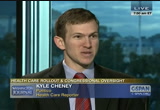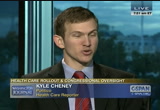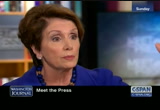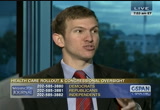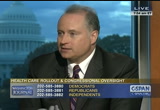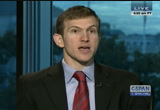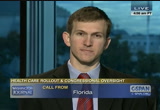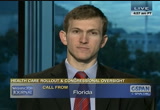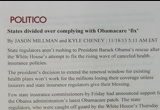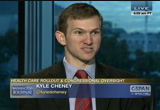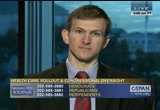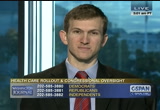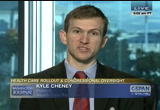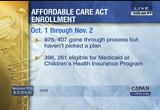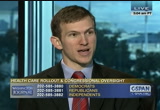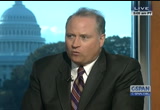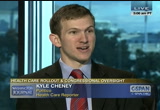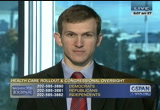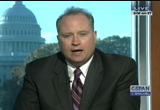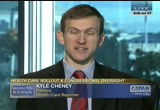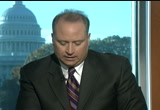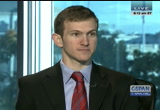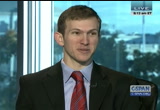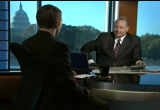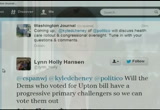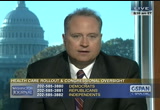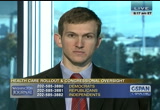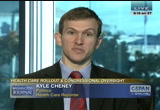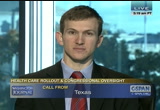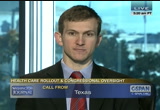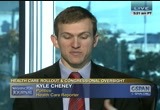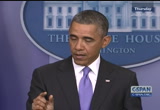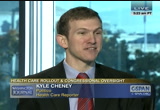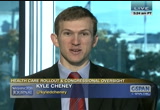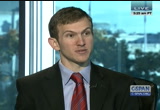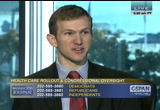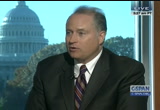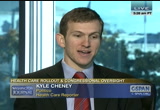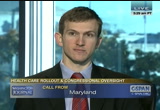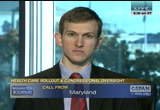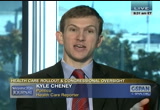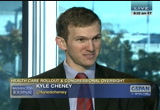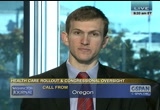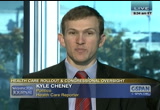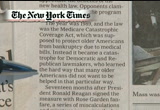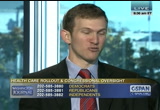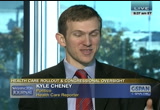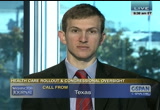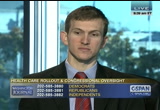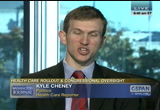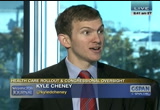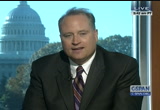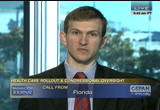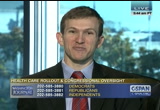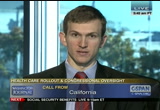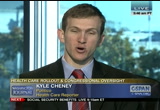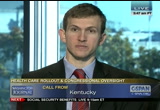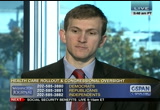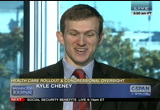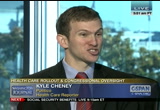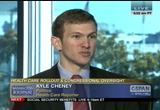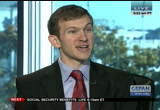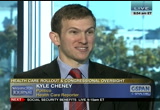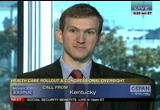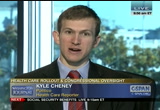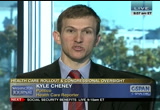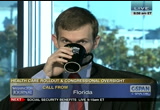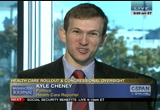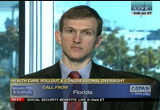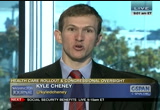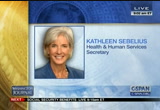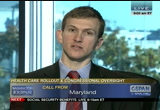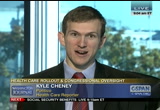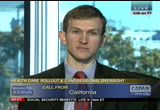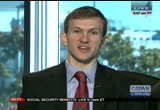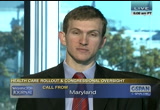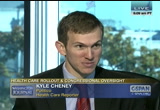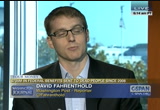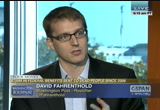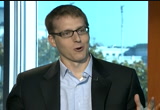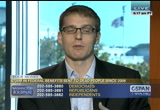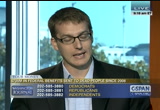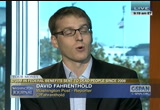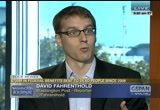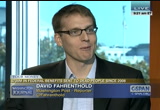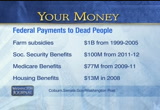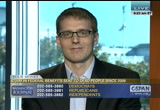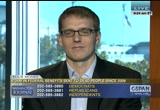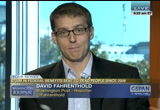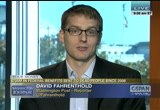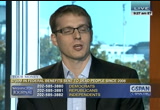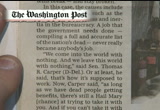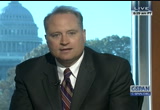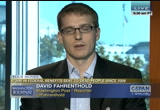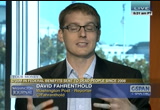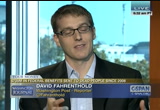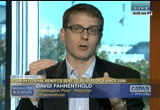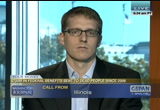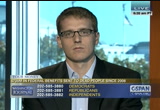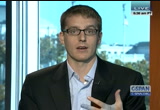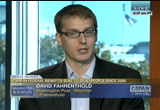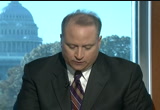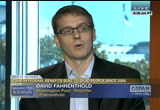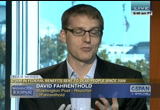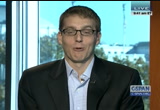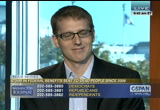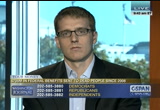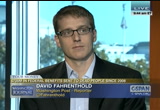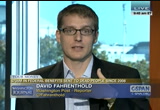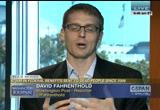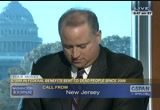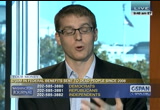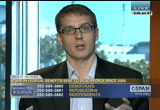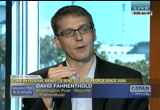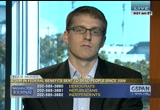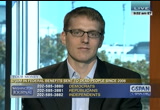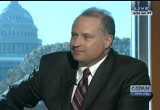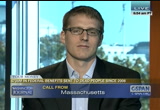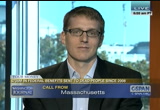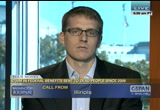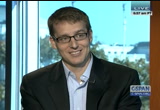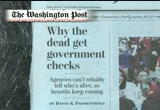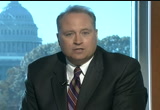tv Washington Journal CSPAN November 18, 2013 7:00am-10:01am EST
7:00 am
david baron hold discusses inaccuracies in records kept by the social security administration. resulting in federal aid being sent to individuals who are deceased. >> the u.s. house and senate return to work today, one busy week of work before the thanksgiving break and it is energy that is topping the agenda this week. over on the senate side defense programs. also they continue to struggle with the issue of judicial denomination. they have a vote later this evening. of course health care is front and center both on the hill and over at the white house. lots more in the papers today. democrats areays,
7:01 am
bristling at that comparison to president bush, but it does cause issue, president second terms. a lot written as well as recent days about the issues and problems the president's face in the second terms. i want to get your thoughts. if not by phone, you can weigh in with your comments on presidents and second terms at twitter. our e-mail is journal@c-spa n.org. dave boyer writes that a perfect storm of blunders, broken promises and rebellion in his own party over obamacare is raising doubts about whether the president can recover from the month-long debacle to govern effectively in his second term.
7:03 am
also on abc's "this week." here is a look. >> where could we be in four or five months? hopefully the website is working fine and people are enrolling in healthcare. hopefully we will not have another bout of washington dysfunction. we pass a budget and move forward. the economy continues to strengthen. we could be in a much different place to her for months from now. no doubt, this is an enormously challenging time. you do have to have perspective. the story can change and once , theebsite gets fixed republican platform is going to
7:04 am
7:05 am
richard smith joins us by phone to give us a more broad perspective on all of this. good morning richard. caller: good morning. say --e're the president what is the history of residents in the second terms and coming back, if that is the right term to use. is an interesting phenomenon. the second term jinx is really as old as a presidency. george washington had a difficult second term. divideds were sharply for example about the war in europe and whether we should be with france or england. yet political parties starting to take shape, allowing the ideas of jefferson and hamilton. jefferson himself had a hugely successful first term.
7:06 am
he is remembered most of all for the purchase of louisiana. but by the second term he too became mired in european affairs embargoared an economic , which wound up hurting american commerce more than european. franklin roosevelt carried all .ut two states in 1936 hubris, which is the great danger of presidents who have mandates who may be over interpret them let him to the famous court packing scheme at the beginning of his second term. he also tried to merge southern conservative democrats in a number of party primaries. he did a price for that. even presidents who are up on tont rushmore are not immune
7:07 am
the way things seem to be on an almost unavoidable jinx. , is it theat is it length of service that e is it congress, the media? caller: i think it is a number of factors. i think a lot of it is simply fatigue. i think it is even more of a problem in some ways for a lot of presidents given the extraordinary intensity of the 24/seven news cycle. homesents come into our around the clock. i do think you heard about bush and now clinton fatigue you are about obama fatigue. there is an element of the saturation coverage that any
7:08 am
president today attracts is ironically both potential he his great asset. it gives him great incident instant and total access to the public, but it is also a potential danger. the danger of overexposure. i think that is one factor. i think another factor is often you have burnout. you have some of the best people who come in at the beginning of the administration and there is oftent wave of energy, change and excitement. it is for difficult to sustain that for a years. the time you get to his second term, a lot of those people are gone, congress may very well be feeling its oats and may be more initially.han you may have problems within your own party. there are a number of factors that come together, but one of
7:09 am
them clearly is, as i said earlier, hubris. when presidents, particular ly those who are strongly reelected maybe even more than as richarded, such nixon and watergate and bill clinton and lewinsky. there is his constant danger of presidents overinterpreting just mandate or overacting. sure, thank you for your time this morning. before we go, any particular examples of presidencies that may have started slow with particular problems but perhaps ended strong echo caller: i look at ronald reagan second term. of course, there was iran contra and that is a stain that will be there forever, but guess what?
7:10 am
it also was in the second reagan term that we did something quite historic. we illuminated -- we eliminated one class of nuclear weapons. we brought the cold war to a conclusion. it may very well be in the long run that ronald reagan is remembered more for foreign- policy, even for domestic, and it may very well be that his second term that at the time was viewed by many as a classic example of the jinx, was in fact much more successful. host: thank you from is historical background. much appreciated. call this morning from mark in odessa, florida. mark, we're talking about presidents and second terms. what would you like to say? caller: well i'd like to say that quite honestly i believe that too many presidents that do have a second term create quite
7:11 am
a disaster for the party with very few exceptions. delhi to that i can really think of would be eisenhower and reagan. that is because they attacked and -- inobject is their second term. their second term in parallel the first term with president , the, president clinton second president bush and now , they are still rally from their first term and complete their objective. i think if you don't completed in the first term, don't try to keep it going in the second term because it is going to be a disaster.
7:12 am
7:13 am
scandal with president reagan, monica lewinsky with linton, you're talking illegal issues that were pertaining to those second term issues and those presidencies. obama, i just don't see it. it was a mistake, it had to do with the operation of the program, but it had nothing to do with anything the legal. it didn't cost anybody's lives such as hurricane katrina did in the bush years and i think is overblown. speaks thatistory the interim presidencies are our disaster. arethey know that residents trying to accomplish your own private agenda, but i find it offensive comparing the health- care rollout to katrina where people lost their lives or iraq were people lost their lives and
7:14 am
iran contra where stocks are using traded. that's pretty much all i have to say. headline of the start of the conversation that the viewer responded to. democrats personalized comparison to bush. it actually quoting a democratic strategist here. gary self has labeled the affair obama's katrina. "the washington times" goes on therite this morning -- administration has yet to turn the corner on bad news.
7:15 am
gail collins wrote an opinion piece earlier in the month, actually, before the latest wave of healthcare. she wrote that a second term is always bad news. maybe there is no such thing as a happy second term presidency. through.k this discussing presidential history would be much more fun than discussing health care.gov. hours enjoy having a second chance to find out more about .rover cleveland first to get cancer of the mouth. that was the beginning of kleven second term.
7:16 am
7:17 am
it proliferation of derivatives that brought about the financial crisis. is -- a couple people mentioned reagan. i think his last term was the savings and loan scandal. i feel as mr. obama is districting to the presidency. he comes up with an idea, he announces it to the public and then he expects congress to do all the work while he vanishes into his ivory tower. yeah, i think second terms can be very bad things. thanks for calling. we have some treats this morning. we have phyllis on the line from new york. democrat. good morning, phyllis. caller: good morning.
7:18 am
i think the president is doing an excellent job heard the thing is that he's black. half of his attractors feel he shouldn't even be there. the comment you made from the tweet, she is on point are that man is black, he is not supposed to be there. i am really proud of you mr. president. don't give in to these republicans and all these other haters. is a shame. you are half white and these people just despise you. you're doing an excellent job, keep your head up and i didn't like the idea you're getting into them last thursday or other human -- health care is good. it is a good thing for us and they know it and they want you to go down as the worst black resident ever. i am proud of you. i work with seniors who never even thought they would even see you sitting there.
7:19 am
they are very proud of you. i am too. your family, i love you all. host: that was phyllis from new york city. -- rickyammond writes is on the line from jacksonville florida. independent, welcome, ricky. my question is, you know and they said to the president a veto, filibuster, everything he said, they have said against him. wondering if they compare how congress -- with clinton
7:20 am
they said how they worked with clinton for the couple things he passed even though there was opposition. i was wondering, will that be quoted or written in history. they should say right off the bat that we are not going to work with this man and put him kind of a way. if you make that statement, then there is no way you could get a summation of the positive impact other than being the first president of color. that in thisate country, for those people who have a problem with all the multi-hat we are a college community now. that is the future and america was born out of transition and transformation. that is just a way is going to be. are not -- i'm trying to find president -- has
7:21 am
ever been present when they say that we are not going to work with them and they are just turning around and try to give host: wete summation really want to get an update on congress. thesack is monitoring happenings on the hill. how about the floor for the house and senate. what are they trying to do this week and is there any must do legislation out there? the senate is starting work on a defense authorization bill. they have a vote to proceed tonight on that. there will be a series of debates on a range of issues in the senate, whether it is syria, afghanistan, dealing with military sexual assault, there
7:22 am
has been a big issue. they are just doing started on this bill. they're not meant to finish anytime soon because of the amount of amendments and thorny issues. on the house side, republicans taking aim at president obama's policies. there'll be a series of bills on .racking the obama administrations regulations are returned to make it easier for oil and gas companies to get permits on federal land. -- is a rangee debates. host: the senate will consider a presidential nominee to the powerful u.s. court of appeals for the district of columbia circuit.
7:23 am
the first two nominees failed to achieve their courts. there is a third this evening? sir john cornyn has been in this battle where republicans say that their argument against isroving the d.c. nominee the exact argument the democrats use in bush administration that you don't need this many appointments on the d.c. circuit. however democrats of counter that and they have continued to push for these votes, is just it has one of these -- nothing to do the individual nominees. then there's his constant talk of au sable nuclear option when they have the standoffs. harry reid is moving very aggressively on this, moving forward on this. there is another nominee, mel watt, a democrat from north carolina. his nomination has been held up.
7:24 am
there others in the pipeline that could be controversial. the biggest one as far as nominations is likely to get through, but it is going to be -- there are going to be some no votes. . is going to be janet yellen i think the thing to look for us the house vote on the senate to look for something companion bill to the up 10 that was voted last week. 39 democrats defected. it was lower than most people thought. still, 39 defections on that i think theix, lower number came in because president obama came out with his own administrative fix heard that has been criticized by insurers as well as the insurance commissioners of the
7:25 am
states. it is daily updates of where the website is going to be and we're going to have more oversight. hearinge is holding a on data security. that is the next big thing with obamacare and it is -- and its troubles is how secure is information when people go to sign up to enroll. that is what this committee will be looking at this week. thanks for the update. we look for a busy week here on the hill. we are talking about presidents and second terms here, some of issues and struggles at the current president is facing, but a lot of historians and journalists out there writing that this is nothing new for a second term. ,e looking for your thoughts not just about president obama but others. perhaps your perspective as we start the week. howard has been waiting from vienna, maryland on the democratic line. a howard there is caller: caller: yes, i am a democrat.
7:26 am
my mother taught me to be a democrat. ways very proud of the eisenhower ran. our country. to the last five years, we had a president which i believe is a good man but had no help whatsoever to even run the country. everybody was trying to pull him down. first turn, second term, whatever term they may have. it may be a bad turn to the eyes of some people. who doesn't need health insurance? see how many people would tell you know, we don't need it. regardless of how we get it. thanks for calling.
7:27 am
7:28 am
compare this to a man-made disaster. 85% of the people in this country have had health insurance. he cut medicare to kill off anybody white over 65. he is on a governing for one class in this country. i will tell you something. i have a daughter that is a nurse and the illegals don't use emergency rooms for minor stuff. i am not arguing with her a major problem. losing our rights and we are losing our benefits because of them. independent caller: caller: this president particular having such a difficult time byause a conspiracy
7:29 am
republicans to make sure he had no second term, that his first term was horrible. you have to expect the craziness that is going on. i must say, as far as the health thing and this poor president, anybody ever think about sabotage? we are talking outside contractors. member edward snowden? and they genius people can't get this right? there is something very wrong. somebody needs to look deeper into what is going on at not just throw out a bunch of -- oh, obama's horrible. obama is wonderful. but because certain people do want him to succeed, no matter how great his ideas are, they're going to knock them. it is very sad what is going on in this country. we are supposed to be building up america. her supposed love this country more than we hate the president.
7:30 am
but unfortunately, it is not happening. we are such a country at war. by trying to destroy the government, people are trying to take all the government heard it is called treason. it used to be. that's just pray for america and have somebody with the thinking like, turn on the battery. look uber. is onspringfield, ohio the line right now, democrat. was calling about the president. they didn't try to kill the president. i said no, they didn't try to assassinate him with a gun, but they're trying to assassinate him in every other way. let healthcare roll through. everybody does not have a computer. what will the people do you can't get on the website anyway? i went to my doctor's office and signed up for third they're
7:31 am
doing is in the doctors office, the welfare office, you'll just have to go on the website. toy're just tried assassinate my president. i love my president and i think he is doing a great job. mr. president, don't you give them, don't give in, don't give in. thank you and have a nice day. host: from the phone back to facebook. some of the headlines out there this monday morning. "wall street journal. members are quite sure how to
7:32 am
7:33 am
that from the governors today of washington, kentucky and connecticut, an op-ed piece in "the washington post." your perception, your reflections on presidents in the second terms? caller: thank you for having me this morning. this is joe from kentucky and i think the president has caused most of the problems on his own. he promised a lot of promises. he is palling around with bill clinton at one time
7:34 am
was the biggest liar in a country. i don't know if you could solve them both together, but anyway mr. obama is trying. but when you stick your foot in your mouth and do things, you have to come out until the truth. he has done that. but it doesn't seem like he is honest about it. -- does? when he gets up on tv and tells her but it is in that very it he does not look like he is sincere about to new jersey or. that is why, this morning. host: good morning denise caller: caller:. killedthere were people and murdered. americans in the benghazi
7:35 am
attack. no one has ever come to question about that. if we had pushed as hard and getting information about fast andand the furious, we would have answers right now. but now, we push hard on this health care debacle, but there are still unanswered questions. people were killed, americans are murdered and we do not have that.swers about and getting really angry with these people who keep standing up and saying he's a great president because he's black heard there were many people who ran for president who are black who are more qualified. alan keyes ran against george bush i would've voted for him he was a black man well before obama came along. obama was not the white black man. in carson. if that president ran in the next 10 just because he is black -- people have got to stop looking at black and white issue. they have to look at the person and say is this man qualified to
7:36 am
7:38 am
7:39 am
all they care about is their agenda. host: ok. moving onto russell now, berkeley springs, virginia. what would you like to say about presidents and second term? it are the current president or anyone else. johnson,yndon baines when he was president, but passed medicare and actually ,nrolled 20 million americans 20 million elderly americans into a single-payer system which is medicare. us to -- he did in six months on index cards. in fact, obamacare was written by health insurance lobbyists because it keeps them at the center of the game. if we do johnson actually ascended medicare for everyone, we wouldn't be having this debate right now. we would have the same system that covers everyone as canada and taiwan in all of western europe. everybody in nobody
7:40 am
out, controlled costs, free choice of doctors and hospital. basically, when you're born you get a medical care card. refer to the dr. you swipe. there's no extensive billing with co-pays and deductibles. that is what obama originally said he wanted to when he was a young politician, but then as he moved up the political ladder he started kowtowing to the powerful health insurance industry. so the reality is what we need to do is repeal obamacare which is written by the health insurance industry and replace it with a simple, single-payer system. a lot more information on this would be a single-payer action.org. if you listen to c-span in the morning you with ink that there are people who support the president and support obamacare and people who hate the president and are opposed to it. in fact, the reality is most people want a system where we are all covered, where there is a social safety net and where
7:41 am
you don't have 40,000 americans dying every year from lack of health insurance. repeal obamacare, replace with a simple single-payer system single-payer action.org. host: extra calling. back to the papers. here's a picture paul ryan. we had him on saturday night at an event he did in iowa. here it is, he was helping celebrate the governor's birthday there. the governor is having his efforts to tame the national budget. journal" haseet this piece is morning. there talking hillary clinton here.
7:42 am
the "chicago tribune" has this front page story about tornadoes raking the state of illinois. you can hear the wind going over and it just feels heavy surrounding you. photo backont-page to the "wall street journal." in the philippines you can see different -- you can see a of peoples dash rushing for water. caller: good morning. i'm just sitting here listening to these americans, they are americans. i have so much to say in such little time. yes, all presidents deserve a second term. .articularly obama he was stopped so many times with what he wanted to do the first term.
7:43 am
since 2010 came in and the tea party clans came in with them. i just want to say that america's biggest blight in history was slavery. and they haven't gotten over it yet. it is still there. for those who think that color is no problem, think again. please think again. that thing ghazi thing that they've been talking about today for a were murdered. i am so sorry it happened. but let's talk about iraq, how many americans were murdered there. any problem? no. no one had a problem with it. that started over a lie. i just don't know what to say. i hope the healthcare thing wins . i hope it picks up because all lp. he's need hea
7:44 am
been trying to help them since day one. he's been stopped in every track verdigris with a woman who said that i think it has been sabotaged the republicans. if they would shut the government down because they don't want it, they would do anything to stop it. byron now inry denims brings, louisiana. i agree wholeheartedly with the lady that just talked and the man from west virginia. the republicans had better watch what they wish for. if obamacare goes down and we are going to get single-payer insurance. they better start pushing obamacare if they don't want to see single-payer insurance country united states. thank you very much. one of the story on to point out is to run out of time in his first segment. financial times writes that is
7:45 am
the lead story, is related rhetoric over the nuclear program in iran. that is the latest headline there on the run peace talks. or nuclear talks, i should say. dallas, texas our last call. good morning. good morning. i'd like to say that i just want to root for the president because he did a great job under tremendous pressure. no one wants to agree to the jobs bill or anything that he puts forward. i remember when i went to vietnam many years ago a lot of .uys were calling in
7:46 am
they ran to canada. i am suffering from the vietnam war today. i just want to root for the president say you're doing a great job and keep the good work up and keep your head up because this healthcare care bill is going to go through just fine. take care of yourself, mr. president and family. our last call from william in dallas. we will take more calls on the healthcare issue in a few minutes after our break. rollout andbout the oversight issues and of course the website, the health food, you name it on health care. plenty more time for your calls there. later in the program we are going to talk with a reporter from the washington post, and --y've it fair and told hrenthold. we will be
7:47 am
right back. >> every weekend since 1998, booktv has brought you the top nonfiction authors including hannah rosen. >> i think women's identities are tied up to work in a way which we may not like, anyway we may find disturbing and unnatural but it is true. when i look at some one like marissa mayer he was recently chosen to be the ceo of yahoo, when she was visibly pregnant, and that was asked how much maternity leave do you want to take and she said basically none. the fact that such women exist is not the way i would do that.
7:48 am
i took plenty of maternity leave, but i would feel like woman that kind of there can be space for. and the fact that there are some stay-at-home dads who are happy stay-at-home dads that do not all live in portland oregon, that is ok too. >> we are the only television network devoted exclusively to nonfiction books. dr. fall we are marking 15 years of booktv on c-span2. >> mrs. johnson as first lady love to show off the texas hills country at her home. guests to the ranch would often informally gathered here in the den. various heads of state came to visit. we do have a few things to speak to her connection to the room here. one of the things she wanted to highlight was native american heritage here in the hill country. she did have a small collection of arrowheads over there. she had an eye for copper and
7:49 am
collected various items through the years and had gifts from various friends. mrs. johnson david tour of the house in 1968 where she featured the cheney that you see here purchased in mexico. it was very important because it provided such a respite from all the turmoil of washington, particularly later in the presidency where the johnsons could come home, recharge batteries and make that connection back to the land and this place that they valued so much. lex first lady, lady bird on c-n, tonight, live span. c-span, we bring public affairs events from washington direct to you. putting you in the room at congressional hearings, white house events, briefings and conferences and offering complete, gavel to gavel coverage of the u.s. house. all as a public service of private industry, where c-span
7:50 am
-- we are c-span. we are created by the cable tv industry more than 30 years ago. now, you can watch us in hd. >> "washington journal" continues. queue search gives a good update on the affordable care act, where it is and where it is going. when i was told the house vote on friday. remind us exactly what the house is voting on. how was it different from what the president was saying before? the house voted strongly for a bill proposed by fred upton. which was called the kindred healthcare act or something along the lines was intended to get along with the issue of people who were losing their healthcare. accordingent's plan to the supporters would
7:51 am
undermine the law by allowing people to sign up newly for some of these plans that don't meet the requirements of the affordable care act. in other words, if a plan was getting phased out because it lacked benefits of the affordable care act, the epson bill would allow people not only to keep those plans, but also sign up for them newly in 2014. the president's proposal differed in that he didn't want people to be honest plans long term. he provided a grace. for those people who might be losing the plans otherwise. host: one of us critics of the dozens of health care votes in the house in recent years is that they were meaningless. one. how important was it? guest: what was significant about this was that 39 democrats sided with republicans on this. a clear attraction to democrats, especially vulnerable democrats.
7:52 am
the bill has no chance of passing its current form, there's a lot of concern out there that democrats are vulnerable on this issue people losing their healthcare plans. host: nancy pelosi, the minority leader of the house stepped in to one of the sunday morning talk shows. here's a look. >> think you can tell what will happen next year but i can tell you this. democrats stand tall in support of the affordable care act. we have great candidates who are running who are concerned about our economy and are concerned that the government was shut -- they'ree of a concerned with overwhelming support of the people. support ending his commission
7:53 am
against people in the workplace. all these kinds of things are the concerns of american people. jobs will be the major issue on the campaign as they always are. this is an issue that has to be dealt with. it doesn't mean it is a political issue and sober manager and away from it is too .aluable for eric and people what is important about it is that the american people are well served. although upset problems that plague is all the cancellation notices, will the a blip on the screen and people will start realizing and
7:54 am
benefiting from the priorities in the campaign trail next year. they give a talk about things .ike -- it's a question is really get health we shoulde pages point out, we were hoping to have alex wayne join us as well, she is from bloomberg news have ribbon talking about the congressional bill already.
7:55 am
it landrieu bill is a slap on the wrist. basically, chastises the president for saying if you like to help eric -- if you like your healthcare plan you can keep it. enabling people to stem plans a don't meet the requirements. the political fate of that bill is also an open question. it is not the upton bill, it is not as scary to democrats as the upton bill may have been, but it is also a sign that democrats are uneasy about the politics of people losing their health plan. host: is there any big hearing are big meeting that we should know about over the week? a hundred percent sure from the docket. i know that bill in particular is going to get a lot of attention. the senate probably will consider that in some form or
7:56 am
another. the president obviously charge taken off the agenda with his own fix but it doesn't seem to mollified everyone. we haven't heard a lot. caller: good morning, how are you. host: doing well how are you? caller: i had my policy canceled. i'm a senior citizen. plan on november the eighth. than i am.ears older i'm going to be 82. he got canceled because of pre- existing diseases, but he went to hospice which i cannot praise . they just took a whole bunch off of my shoulders.
7:57 am
presidentening to the , and i had artie gotten a policy that was so much better ,han what they canceled me on no referrals. those referrals, you could be three weeks. i have cancer of the skin. in three weeks it took to get a referral by that time the cancer had grown twice as size. i called my insurance company had told him that i listen to the president. if they went through. what they reinstate me if i had another policy. this is their answer. we didn't cancel you because of the affordable care act. your goal when you joined up with us, we were already in the process of selling took another insurance agency. his changer story completely. i think that's at these people are going to find out. it is not the affordable care act, it is insurance companies. i was wondering if betty
7:58 am
lou was on medicare. anyone over 65 is not meant to be entering the insurance programs for obamacare. thathe did have a point insurance companies in a lot of cases are the ones that are changing these plans. one thing that the white house is try to emphasize is that even prying to the affordable care act insurance companies were the ones making the also changes to people. a lot of these cancellations were not dreck they derived from his health law. i think that is the point, he's really try to hammer it home. host: here's your updated piece in "politico." regulators are dressing to president obama's rescue after an attempt to fix a rising wave of canceled policies. when president obama
7:59 am
announces fixed last week, he . insuranceproblem to companies have to play ball to. what we have seen is state regulators, even if they want to comply with the president's wishes, they might be constrained because they have to do it quickly. they only have a few weeks to really get their rules and regulations updated. changes,y when the law they may take months or more. a lot of them are saying, even if we were interested we couldn't do it great a lot of them are saying flat-out they're not interested because they don't want to reintroduce these substandard plants back into the market. it remains to be seen how many fix will president's
8:00 am
apply to. if states don't go along it could be a small number. good morning. six months ago, one of your ladies from the kaiser institute mentioned -- something that no one has really talked about recently -- the fact that these people, they keep talking about subsidies. apparently, it is in the law that if your estate did not expand medicaid, people in your state or not qualify for the subsidy because they did not have enough money to qualify everybody. that is going to hit the fan. paul ryan -- every time he gets -- one of these congressional hearings, he mentions. when he is talking to these representatives for the health care plan, he mentions to them, by the way, there is a clawback feature. giveey accidentally
8:01 am
someone a subsidy that is not supposed to get a subsidy, technically, they go back out of the next year when that is fleshed out with the tax system, they are supposed to call this money back. also, when these congressmen say you can get a subsidy, they don't understand, people cannot even afford with a subsidy. what is really different about this, people are not used to paying a monthly payment for their health care. a lot of these people -- it is just -- they do not realize that people out there cannot afford these plans. he specially, you get somebody who is only paying $200 a month, that is 2400 dollars a year. then they find out there is a $6,000 deductible. that is before the insurance companies have to pay anything. host: let's hear from our guest. guest: you touched on the issues
8:02 am
our -- people are concerned about. on medicaid expansion, i'm not sure if there is a relationship with subsidies on the exchanges. you are right that states that have not expected medicaid, it is not that i cannot get out subsidies, they lose out on the -- not thatlars they cannot give out subsidies, they lose out on billions of dollars for the medicaid population. their existing medicaid programs, no matter how ungenerous they are or how would they are, those remain in place for the most part in states that are not accepting medicaid dollars. you said that people who get a subsidy that they were not entitled to have to have that clawed back. a processue, it is called reconciliation at the end of the first year when people file taxes in 2015. they will say how was your
8:03 am
income, was it expected you? if it was higher than you thought, you have to give back a portion of your tax credit. littley the states, a bit about where we have been and where we are headed. sign up again october 1. coverage was set to begin a little more than a year -- a few months. january 1, 2014. consumers can now wait as late as march 31, 2014 to sign up without a penalty. some other facts and figures here. 06,000h november 2, 1 plans were out there. based,were state- toy 5.2% were federally facilitated. just under one million people have gone under the process but have not picked a plan. just under 400,000 are eligible for medicaid or chip.
8:04 am
the numbers who have actually signed up have been very much in the news lately. what if the government -- what has the government said lately? what will they report again? monthly basis, early to mid december. i will be a lot more significant. it will show progress they have made fixed -- fixing the website, which has really blocked people. we will get a sense of the progress they are making. we're going to find out if young people are signing up. what is not in those numbers is the mix of people that are getting covered. the obama administration needs young people to sign-up to help offset the cost of the older and sicker population. get a clearer to breakdown of that in december. those numbers will matter more than the first round, which sent the baseline going forward. whenever you described, that 945
8:05 am
,000 that have gone through the process but have not selected a plan, that is doing the white house -- that is buoying the white house. all people have to do is click on a health plan. what they are hoping is that people are actually shopping, comparing plans and taking their time, they are not stuck at a blue screen error message. they are hopeful that those people are in the marketplace. 75,407 according to hhs. november 1, that is the date that the administration -- guest: november 30. host: a lot of dates. that is the next key date, explain what you are looking for to happen. we have already seen come over the weekend, expectations being lowered. steadyit has been a process of lowering expectation for what november 30 is going to
8:06 am
mean. the enrollment system on healthcare.gov, where most states are going to sign up for the new subsidized tax credit waste insurance plans on the exchanges, it has not worked well. it has barely work. it has slowly gotten better. ae white house has called in team of tech experts to fix the site. they said by november 30, we will have the enrollment system up and running for the vast majority of users. that has been the amorphous part we are trying to pin down. we have seen reports suggesting that that is 80% of people trying to sign up. it is going to be hard for us to pinpoint on the outside whether they actually achieve that. that is the magic they are working with. host: as we go back to calls, once we -- one tweet.
8:07 am
aca as anis using the excuse to do nothing." baltimore, you are on with kyle cheney. you for c-span. i was curious about something, you did touch on this somewhat. considering the fact that aca was enacted three years ago, not last month, three years ago. obviously, there has been some transitioning in 2010, 2011, 2012. transitioning people out of the bad plans into other plans. howthere been analysis on many people were rotated into new plans during that period, and what the real numbers are with respect to cancellations? whether these were cancellations that happened last month or and a commission -- or an accumulation of policies that have been canceled over a p eriod of 3 years. guest: you are right that there
8:08 am
have been studies done, some figures show that this churn in the individual market, where people are losing their plans, they have been losing their plans for a long time. their benefits have been changing. these plans change constantly. they are always transitioning people. the is different about recent wave is that a lot of the cancellation letters specifically cite the affordable care act. you could argue that that is insurance companies using the cover of the health law to do what they have always been doing, moving people off their old plans and onto new ones. in some sense, it is the result of the affordable care act implementing more stringent and cover hence the benefit -- and cover hence it benefits. -- co mprehensive benefits. host: phil from florida. caller: i was recently hospitalized for three days, i was charged tens of thousands of
8:09 am
dollars for services that should have cost a minute fraction. with healthproblem care is obviously the cost of services. obamacare does not address that. the insurance policies that are available are very expensive. my question is, how many people do you think will actually sign up for these policies? do you agree that the problem with health care is the cost of services? thank you. a consumer perspective, cost is king. everybody wants to know are they going to pay more in premiums? what will happen with personal health care costs. the affordable care act has mechanisms that limit out-of- pocket expenses. should notured, you pay more than about $6,350 in out-of-pocket expenses a year, that is with a bare minimum plan. the law does take a not some degree at what people -- the
8:10 am
share of costs that fall on people. the number of people who sign up, the white house is hoping that about 7 million in role in the new exchanges in his first year. and is the goal of the cbo what action race crash of the cbo and what actuaries think needs to happen. of theetailers are wary health law, they are afraid of losing business. walmart and true value, two of pointed outanies here, saying the aca will take a chunk out of consumers' pocketbooks. they might be spending less and stores. there is a tweak here. -- tweet here. how are the sign-ups going in states that started their own exchanges? clear there is a division. when they released numbers, the
8:11 am
states that elected to run their own exchanges, by far in role enrolled more. maybe a couple do not farrt fully, they all had more sign-ups. even if those did not meet their targets, the division was clear. states running on healthcare.gov had a fraction of the moment. host: three governors write in "the washington post." washington, kentucky, connecticut -- how we got obamacare to work. they have an op-ed in the washington post about their efforts in their states and how things have been going. they make a point that the aca has been successful there. andur states, political community leaders grasp the importance of expanding health care coverage and have a 40 -- avoided the temptation to use health-care coverage as political. hard to say that
8:12 am
there weren't politics and play here too. but for the most part, they are right. governor beshear in kentucky have the ability to establish an exchange and expand medicaid, he could bypass a legislature. because he could've, that --hout the resistance because he could implement that without the resistance of able toures, they were see with the law looks like without the political wall or trip wire at every turn. kentucky is an example that everyone points to, this is a state where it is working it was designed. host: kyle cheney is health policy reporter for politico. taking yours, questions and comments about all things health care. rollout, thehe politics as we have been talking about. one of the voices out there this
8:13 am
weekend was senator john barrasso of wyoming. he was on one of the morning shows yesterday to talk about health care. [video clip] time to start over. this health-care law is terribly flawed. it is broken. it has failed the american people. they are losing insurance, losing their doctor, their premiums are going up. there is going to be a massive taxpayer bailout needed just to deal with the impact of this health-care law. this is not with the american people want. the president did not need to destroy a good health care system to try to make a better one for my that is what we have now. host: one of the gop voices out there. guest: senator barrasso is a come from tends to the perspective of someone who has lived in the health system. i think he would be hard-pressed to find people to agree that today's health care system is good.
8:14 am
his argument is that the system under obamacare would be far worse. he is talking about starting from scratch, an idea that republicans continue to speak very calmly about. is increasingly difficult, the longer the affordable care act is implemented and the more people that sign up. even though the numbers we talked about on the low side, it is still about 500,000 people who now health care or are in line for health care in january who did not before. talking about starting from scratch and ripping obamacare off the books is a taller order. host: speak more about that. standard," they asked the question what will republicans offer to replace obamacare? that word "replace," what might happen? this anything significant come? been theis has republicans' problems is the
8:15 am
affordable care act passed, articulating what a replacement would look like. we hear ideas like allowing states to sell across state lines. they use the catchphrase "patient centered care" a lot. the few other ideas floating around in republican circles that do not have the sweeping nature of the affordable care act. maybe that is by design. also, the affordable care act does rely on republican ideas brought together in a way republicans can no longer support quickly. a lot of those ideas were from the republican will chest, making it hard to articulate the alternative. host: here is a tweet. dems who voted for the upton bill has a primary challenge so we can vote them out." guest: they were reacting to their district.
8:16 am
it is a great question, whether they will draw -- there will be a more robust debate on the democratic side about the future of health care. one of the things we have heard, if the affordable care act falls apart or if democrats run away from the affordable care act, one of the places they will turn is to single-payer. the idea does not have a lot of political support the states. it is something a lot of people on the left would like. if the affordable care act continues to languish, you may start hearing those voices on the left. whether they challenge people in the primaries or not, i don't know. you may hear that argument raised a little more. host: pennsylvania, lauren is on the line for republicans. welcome. caller: thank you for c-span. i appreciate it. i am commenting on nancy pelosi's statements. statements.bama's
8:17 am
you can keep your health care plan if you would like to. those of us in the republican party and the tea party are warned about this when we spoke about how people were going to lose their insurance. it is a very simple concept, when you have more mandates to provide free services, they are going to increase the rates. just like any company what, they cannot afford to pay for that. taxpayer money supporting unlike the government us. the government does. it was a complete lie. at the president not said that, he would not have won the election. int is the simple fact regards to why he said what he did. he had to say it or he would not have been reelected. after the election, this whole year before all this happened, all we heard about was how it was a mandate. the people elected him were in
8:18 am
favor of the health-care bill. they were in favor of the bill because they were told that they could keep their current insurance policy. they were not bad policies, it did cover what they wanted. it did not cover new minutes by the health-care bill for mental health -- new mandates by the health care bill, mental health, maternity care. for them to say that the health- care -- that barack obama's reelection was showing favor of the health-care bill. sure it was, now it is not. guest: you raise some interesting points. that peoplehings sometimes forget is that the president and insurance companies were pretty much allies in getting this bill done. you mentioned the mandates, a good point. on the flipside, there is the big mandate, the individual mandate.
8:19 am
that requires most people to purchase insurance or face a penalty. that is one of the most reviled revisions of the law. that was a provision fair by insurance companies, it would put more people in their plans. including younger and healthier people who do not cost as much to cover. you're are right about new mandates that cost more and can add cost, but by adding millions of new people into the plans -- into these private plans, the hope was that they would balance out that cost and make the law work financially. host: fred, texas, democrat. good morning. caller: good morning. whatt to remind everyone has actually occurred in the years since president obama took office. you low recall that there was a meeting on the night he became -- you will recall that there
8:20 am
was a meeting on the night he became president of gop leaders. they promised one another that they would not vote for anything that he was supporting. they have followed through on that in the years between. gop members of congress had the opportunity and did participate in planning for the act. and then they just quit. and would not vote for it. the main thing that i want to say is that the gop members of in directre terms of the the constitution of the united states.
8:21 am
the constitution specifically states the responsibilities of congress, both of the house of representatives and the senate. host: let's hear from -- lludes toat that eludea is how difficulty politics have been. one of the things that have been used as a bludgeon, not a single republican voted for the iteration of the affordable care act that passed into law. because of that, it has been easy for republicans to look back and say this was a democratic bill that passed purely along democratic lines. this was not some great bipartisan entitlement. this was purely ran through by a democratic congress. that has made it difficult to gain traction around the country. it has been easy for applicants -- it has been easy for republicans to fight it.
8:22 am
the republican points to massachusetts, but that law had huge bipartisan support in the state legislature, making it easy to go back and fix things when they did not work and tinker with it. host: here is a little bit from the president late last week. [video clip] who got cancellation notices do deserve and have received an apology from me. they want, whether we can make sure that they are in a better place and that we meet that commitment. by the way, it is important to note that a whole bunch of folks who madess and others this statement, they were entirely sincere about it. thisact that you have got percentage of people who have had this impact, i want them to know that their senator or
8:23 am
congressman, they were making representations based on what i told them and what the white and the administrative staff told them. it is on us. it is something that we intend to fix. host: kyle cheney? guest: the president has been getting an earful from congress, democrats in congress, about the fact that they stuck their necks out for him when he said if you like your health plan, you can keep it. andcrats parroted him believed him, believed what he was saying was correct. that made it politically salable to their constituents. now he is out there covering for them. saying if they said that based on what i said, it is on me. i was not -- i did not asterisk that with the fact that some people would lose plans. host: kyl, new hampshire, independent color -- caller. caller: hi.
8:24 am
,y problem with the whole thing maybe it should have been called the deplorable care act. it does not address all of the other medical insurance is that we have. we have insurance is on our workmen's compensation, on our houses come our business, our cities, our states. all of them have medical coverage is. why do we need that? why not one, single-payer, then we just take and illuminate all these other insurances. all the other insurances. there is more than enough money. why have medical costs gone from 5% when i was a young man to 50 -- 60% -- 16%. guest: the cost of entitlements, and the fact that health care consumes 1/5 of the u.s. economy. that is something that both sides address. the debate has been how do you
8:25 am
address that, reforms to medicare and social security, now the affordable care act. the partisan divide has prevented the wholesale look at how to attack those. as for single-payer, i alluded to this earlier, there has not been a whole lot of political constituency pushing for single- payer because it has been a nonstarter politically. particularly in the center and on the right. whether that gangs traction -- gains traction is an open question. host: there is a tweet here, i the the caller was on phone. what percentage of health care spending is spent in emergency rooms? guest: that is a good question. it is a part of a goal of the affordable care act, get people out of the emergency rooms. as a place where people go to get their primary care, if they
8:26 am
get a cold or a minor injury that you could call your doctor. they go to the emergency room, way more expensive than if you had insurance and saw your doctor on a regular basis, prevented illnesses. the idea is to get that percentage down. that is a cost driver in health, emergency care. host: what do you make of what bill clinton had to say last week just before a president can out and made the change? house that put the white in an uncomfortable position. this is right at the time of the upton bill being talked about and scheduled to vote about it on friday. before that though, president clinton came out and said president obama has got to make good on his progress that if you like you're playing you can keep it, even if that means a change in the law. then, president obama endorsed the fixed that did not involve a change in the law. stepped out aton
8:27 am
little bit in front of president obama and put them in an uncomfortable position. addressing short of the upton bill, he has issued a veto threat. clinton forced the white house's hand. is that to help hillary if she decides to run? we are still three years away from 2016, tough to say and evaluate the politics of that. it did force the white house to take a stand, which happened not to be the standard bill clinton identified. host: prior to the upton bill last friday, with the president can on asked for was being described as an administrative mix. how does it work? is assigned by administrative order, is there legislative action? guest: although they have issued is a letter that they sent to state insurance commissioners from cms, one of the agencies
8:28 am
implement the law. it says, just so you know we will not enforce the minimum standard provisions for plans in the individual market for people who currently have them. if those are going to be canceled, we will look the other way and say you can continue to implement those. you touched on the legal basis. hearing a lot of people who say there is not a legal basis. the law has certain requirements, they are saying we will take a hands-off approach and not enforce it. host: what is sliding on the ground? these minimum standards, will be allowed to continue? peoplethis is only for in the individual market. people who are shopping for plans on their own. these are plans that might lack basic benefits. whether it is numbers of primary care visits, they might have really high deductibles and cost sharing. while the affordable care act says you cannot pay more than
8:29 am
$6,300 a year out of your own pocket, plans on the individual market might come with double that. people aren't more for -- are at miore financial risk. requiresdable care act changes to these plans. host: marion, maryland, independent line. caller: thank you for taking my call. everyone seems to be concentrated on the signing up process for obamacare, not the type of care that we will eventually receive. the problems that we are experiment -- experiencing in our county is that the doctors already are putting signs up in their offices that they will no longer accept medicare patients. 72. a medicare person, i am our doctors are no longer being
8:30 am
primary doctors. longerbler -- they bno can admit you to the hospital. only a doctor employed by a hospital can't admit you -- can admit you. hospital islt, our going under. we have one hospital in our county. that is our problem here. just about everything you say is backwards. we need to concentrate on the type of care that we will be receiving. i have one question. law,rstand, in the legal residents can be covered. with auld mean anyone green card. i am wondering if you could verify that. they are not saying illegal immigrants, they are saying legal residents. host: thank you. ~ points.
8:31 am
guest: -- two good points. guest: the law does allow legal residents to shop on the exchange. ,hat is considered a good thing they want more people, younger, healthier people. a lot of transplants to this country tend to enroll in these plans. that is a case, legal residents are permitted. people who are undocumented are ofbidden from accessing any the affordable care act benefits. that is a point of contention among some people. they are still able to access emergency rooms if they have a catastrophic illness or injury. in some sense, they are still contributing to the cost of health care. medicare,r point on there are huge issues with medicare that go beyond the affordable care act. that does interconnect with medicare a little bit.
8:32 am
the issues in which doctors are accepting medicare, issues of entitlement reform. that is the subject of budget discussion beyond the aca. , a biggereet here picture view. still do not understand how this is going to keep costs down. guest: the affordable care act? what we touched on earlier, if more people have insurance, this is a law that is primarily about access to insurance. more people get coverage, the more they are able to see doctors on a regular basis, they have to worry about -- they do not have to worry about do i go to the doctor or pay the rent. when you get people out of the emergency rooms and into primary care, they are not experiencing the scattershot illnesses with as much -- these catastrophic with as much
8:33 am
frequency. in ransom devices the way care is provided, smaller scare -- it the way care is provided, smaller scale things. host: dan, oregon, kyle cheney with politico. the gop line. caller: good morning. i was curious on the affordable care act. an argument.d they are going to be people who get it for nothing and people are going to have to pay for it. on the number that are signing up for obamacare across the country. those are the ones that are going to get the subsidies or get it for free. fact?es this pay for the , i got thisstion
8:34 am
screwed up. host: dan, we will let him go. the idea.s is these people -- the people getting covered now, they are still in the health-care market when they get sick or injured. so the idea is if they have access to a plan, even at no cost to them, they are still seeing doctors in a way that they were not able to earlier. yes, the law does provide no- cost or low-cost coverage for , that is low incomes who it is geared at. the idea is to get these people covered so that they are not seeking emergency room care. a lot of younger, healthier people who often go without coverage because they do not want to pay for it, by compelling them to do so with the individual mandate that must able to like -- that most people do not like, you are getting
8:35 am
younger and healthier people into the pool to bring down costs for everyone. host: perspective from "the new york times," a congressional memo piece. lesson is seen in the field law on medicare -- failed law on medicare in 1989. host: they go back to 1989 and jolly comparison. guest: if anyone -- and draw a
8:36 am
comparison. guest: if anyone will take part in that, supporters of the aca. i take that back, you see cyclical issues in entitlement rollouts. for example, medicare part d in 2006. there was a rocky rollout, but today people love medicare part tond the prescription benefits. that story sounds like the was not something people wanted but turn out to be catastrophic for people who were behind it. you can look back at these episodes in history about how previous entitlements played out and defined support for your position in any of them. democrats look at medicare part d in 2006 as they parallel. a rocky rollout, today it is part of the landscape no one would touch. host: a photo in a new york times piece, 1988.
8:37 am
president reagan has grown weary of the catastrophic coverage act. president bush sought advantage and it. angry older voters storming a car carrying a consciousness -- a congressman. the history of the test traffic coverage act is a cautionary tale. sweeping changes to consumers who may not be prepared. guest: that is exactly what the supporters of the law are terrified of. that is because there is evidence out there -- the law can be entrenched, it is not so entrenched that you cannot do something about it. one of the arguments that the democrats have put forward, this
8:38 am
is not going anywhere. it is the law of the land. republicans will never repeal this while obama is in office. that history tells you that laws do not necessarily become the law of the land and remain settled. for: texas, democratic line kyle cheney of politico. caller: hello, thank you. people need to know that the corporations who are worried about the affordable care act -- they are talking about job loss. it is very sad that a person has to keep a crappy job just because they have health care benefits for an ill relative. now they have choices. this has just happened to my nephew. he was able to move to another job because he is now going to be able to have health care, even though his wife has a pre- existing condition.
8:39 am
secondly, we have a wonderful system in this country. the problem has been access. needs to be emphasized. access is the problem. emergency room care is the most expensive care in the world. republicans put up a plan, i romney, it covered 5 million people. they are the ones that won vouchers for medicare and so forth. people do not want to sign up for the affordable care act, they should keep whatever crappy care they have. who do you think they will blame when they get sick? the first point
8:40 am
you made, something i have heard and to make this point a bunch to support -- i have heard nancy pelosi make this point. if you leave a job, you are no longer tethered to a bad job. you can start your own business without the risk of not having insurance. there is a potential transformative element there. one that the proponents like to talk about. you also mentioned the point on which is true. emergency room care is extremely expensive. axis is not the only issue. one of the problems they saw in past andetts, which access law in 2006 under romney, you could get everyone in the state insured and still have soaring costs.
8:41 am
they have passed subsequent legislation to tackle this. it is not a panacea just to get everyone covered, it may have some benefits. life twitter, "end of treatment is the primary driver of costs?" guest: end of life treatment gave birth to the political andment over death panels issues about dealing with people as they dash at the end of their lives. one of the things that people in the medical world say there is not enough of that kind of -- hospice care, pellet of care -- -- care thatre helps people cope with death. in some sense, that is a solution to costs. not in the way that people who
8:42 am
worry about death panels described, but there is an option for people to do it in a more controlled way towards the end of their lives with input from doctors that they are not accessing now. host: another tweet. "what is the affluent person wants to buy more insurance than the single-payer?" guest: there is the cadillac tax, the tax on cadillac plans that are really generous. that is to get out the overly generous plans that people are enjoying themselves for people that whenever used. host: arlene, florida, democrat. good morning. caller: thank you for taking my call. i want to address, when mr. obama said if you like your plan you can keep it.
8:43 am
in my opinion, he lived up to that. the reason i say that is because , as we know, when the law was 2010,ed -- implemented in the old plans were grandfathered in. at what point do insurers have the obligation to tell 2014, these plans will be obsolete. show them other options. i hear a lot of blaming president obama. i do not hear a lot of culpability being placed on the shoulders of the insurers themselves. at what point will we start hearing these insurers being held accountable? canedy administration -- the administration do better in presenting exactly what these plans contain and what they really are worth, basically
8:44 am
nothing. thank you. if you could elaborate on that. guest: thank you. the president got into trouble over his semantics. your point is one thing that they try to make as this issue became more combustible in rece nt weeks. the president always knew that insurance companies could pull the rug out from under you. his point was they do not have to, they can grandfather you in. his issue comes because people knew at the time that although they could grandfather you in, a lot of them would not do that. to say it unequivocally has gotten him into political trouble. he has apologized. in that sense, that is where the comesomes from -- furor from. i don't think insurers will take the plan -- the blame for that. one pl -- when plans reoffer these canceled policies, they
8:45 am
have to also let the plans observers know what they do not cover, what benefits are omitted from that that would be there if they sign up for an affordable care act plan. that puts the insurers on the spot, you can have your old plan, we will not cover you in x, y, and z situations. you might be better off in the marketplace. host: thomas, san diego. of the market, individual plans, causing the chaos. most of us get our insurance through employers. the last couple years, my contribution to my employer plan has gone up considerably. i am promised by my cfo that is going to go up next year. how much is this going to cost us, what effects this is going to have 180% of us start getting
8:46 am
premiums go -- when 80% start getting premiums going up? i wonder if that was why it was postponed. is anyone looking into that affect? point point.aise an interesting the employer mandate was geared at a small subset of large employers. employers with more than 50 employees who do not provide coverage at all to workers. the affordable care act says you have to come in with compliance with the health care law, one of those requirements is if you are a large company, you have to provide coverage to your full- time workers. aboutis a lot of issues how that works. the delay of a yet raised -- a y ear caused outrage among opponents who said you are going to exempt employers, why are you exempt people who also have to get coverage. you are really talking about a
8:47 am
small subset of large companies that do not already provide coverage. as for the cost of coverage that large company provide, that is an issue. that is separate from the meeting itself -- from the mandate itself. as for large companies that offer insurance, it is the vast majority. we are talking about a small subset that are enjoying the benefits of the delay that mandate. host: bill, kentucky, republican. whyer: i would like to know the democrats and obama are standing up and lying about this, saying it is going to be cheaper for anybody. if you had a pre-existing condition -- nobody is talking about -- talking about pre- existing conditions. my son's insurance went up 20%
8:48 am
because of that. sick, he willets have to pay $300 a month, he can get it now for $80 a month. the younger people and the seniors are going to be hurt by this. -- the democrats claim that the us having to buy insurance, the mandate, this is going to affect anybody under $100,000 except about 15 million who are going to get it for free. the rest of them are going to be $200 to $600 a month. when it started, i said that there would be 31 million not insured, the cbo has backed that up. about 14 million or 50 million
8:49 am
will be insured. i would like to know why nobody is speaking to this. nobody is telling the cost of these people under $100,000, up to $100,000, they keep talking about the subsidy. host: bill from kentucky. onst: the point you touched at the end, there may be part of the cost of the overall law, the subsidy is designed for facing people who are facing premiums that are unaffordable. if you can provide a plan in your marketplace that costs less income, you are required to buy it. if your income is such that -- you are below 400% of the poverty level, which is about $11,000 for an individual, you will get help. that could be if you are just over medicaid, you may get a portion of your premium covered.
8:50 am
if you are under that, you will get on medicaid. you talked about people under $26,000, those are younger, healthier people. those are the people they are trying to get insured to bring costs down. host: a tweet. john in north carolina. how long does it take before policies are canceled? guest: i don't know the exact amount of time, it is an interesting point. one of the nuances in the numbers the initiation released released,tration the people enrolled have not necessarily pay their first months premium. that is how the insurance industry measures enrollment. you have to pay your enrollment before you are enrolled. one of the metrics we will have to watch going forward is how many people pay their first months premium. and how many make recurring
8:51 am
payments. that shows that they are able to afford it. host: kyle cheney, health-care reporter for politico. a native new yorker who went to ran theniversity and campus newspaper. he moved onto the scene house ate house news st service in boston. what percentage of politico's resources are spent on the story? guest: it is huge. i have been at politico 1.5 years. even during the election last year, the intensity around the coverage, in washington, i have not seen anything like it. it is fascinating to be a part of and to cover. it does not show any signs of abating. host: how to get get up to speed on something so complex? guest: once you think you understand everything, you get a
8:52 am
new wrinkle. it is a constant learning process. the question i get is have you read the whole thousand page law. the answer is probably not from beginning to end, but at some point or another, you have gone through every provision. host: take us back to the hill. with thesecurity affordable health care act. we have seen hearings about it. where is that issue right now, where is it headed? guest: computer security has been an issue, primarily because the roman system is broken. republicans, not just republicans, people have found sets of vulnerabilities indian roman site -- in the enrollment site. if people are entering an permission cannot be compromised by a hacker?
8:53 am
i learned that the agencies overseeing this employer on -- hackersheir own ethical to patch these. it is a subject of intense scrutiny and oversight, especially from people who have questions about the law as a whole. there has been tremendous assurances from the administration that these exchanges are airtight. if not, they are doing everything to make them airtight. that is part of the november 30 fix. partdicated to security as of the triage team of repairing healthcare.gov. other kind of hearings are you expecting? aret: no end to hearings we going to see. part of this is a political statement. the republicans have said they ,ant to use oversight as a tool to put a microsoft to the
8:54 am
health-care law. a arthroscopeut -- a microscope to the health- care law. in addition to what we have seen with kathleen sebelius and marilyn tavenner, they may want againr from the top brass as to whether they want to update their thinking on a law. we may get more big picture stuff in december. host: more about life on the hill. here is "the wall street journal." thatg the point immigration, tax reform, a budget breakthrough, things are on hold or frozen. what does it mean? guest: the affordable care act takes oxygen out of the room. it is so politically potent. it affects everyone's constituents. they are getting the most calls on it, too. it provokes strong feelings.
8:55 am
the agenda has come to a standstill, there is evidence that some of these things were at a standstill already. the affordable care act, that is how you fill the vacuum at a standstill. over the summer, when immigration was a big topic. when it became clear that that was stalling, the affordable care act came back with a vengeance. that was the issue everyone wanted to talk about. there is some truth that it gets in the way of everything else. also, it is a fallback for people when they cannot talk about other things. marion,t's hear from kentucky, thank you for waiting. you are on with kyle cheney of politico. democratic line. caller: good morning. my family doctor, our family's dr. of 34 years has the affordable
8:56 am
health care. he told us that is why he was quitting. town on therural ohio river. there is not a doctor on -- i am 66 years old. there is not a doctor that will take a new medicare patient in a 50 mile radius. they do not take new medicaid patients. i understand most of kentucky's enrolees are medicaid. what good is our insurance if we don't have a doctor? explain to me, thank you. fear, it is a real especially in rural communities, that access to health care, it has already been a problem. let alone the impact of the affordable care act, that does not necessarily hurt access to care, there is a sense that it does not do enough to help. a lot of these communities have one, maybe two health-care
8:57 am
providers that they rely on. we learned in new hampshire recently, there is only one insurer offering a plan on the exchange. that is sure that insurer decided that only 16 oof the 26 would offer care. is a huge issue. not to mention the supply of doctors. there is a crisis of the number of doctors in this country before the affordable care act. when you add millions of people, that only adds strain on the number of providers. that is an active problem that has heightened in a rural community. it is a nationwide issue. host: why is there a shortage of doctors? guest: i don't know the root cause. it takes a while for demand to catch up -- for supply to catch
8:58 am
up to demand. it takes so many years to train a doctor. once the affordable care act past, it has been three years. medical world, that is not full training. along the atlantic --- there is a long pipeline. you may not have enough to capture the full newly enrolled population. host: deal, florida, independent caller. caller: good morning, thank you for taking my call. a couple quick points. of thebout the legality health-care law. the judicial branch said his legal. -- it is legal. what is the next step? can we force people to buy car insurance, even people without drivers licenses.
8:59 am
can we force renters to buy homeowners insurance. one day they may need this. that is my question. it was a lot longer. i am trying to cut it down. guest: that is the slippery slope argument that opponents made in court and outside of court. the administration argued specifically that the health care market is unique. ,veryone is in it at all times you may not realize it, but if you get injured, the hospital is required to take care of you. that does not hold water with justices who did not find merit and not. -- in that. it was part of the argument. it would be hard for them to come back and say we also meant that for car insurance, too. or home insurance or whatever. it would be hard host: we will spend 10 minutes
9:00 am
with our guest. he will answer a lot of questions. he has been with us the whole hour so far. fort lauderdale in florida -- republican. caller: good morning. i would like to say that i am a veteran. i fought in the war for freedom of choice. i did not think that we were going to be like communistic russia. dictate that you cannot have freedom of religion, freedom of choice, and what ever you choose to do health care wise. i would like to ask why are we being forced to have health care insurance by the government mandate? guest: this touches on the point i mentioned earlier.
9:01 am
the idea promoted by supporters of the flaw is that everybody needs health care at some point in their lives. there is no escaping it. accessyone is going to it and be part of the cost of health care, then we should take the measured step of getting covered. fromll prevent them wasting their cost on the rest of society. that was it in a nutshell. republicans used this argument in support of the mandate of the past. governor romney supported that point. the narrative flips and now it is democrats making the argument. a lot of people still find that it does not carry weight. at the end of the day, it compels people. some people may not have ever wanted to purchase insurance and now they do so. you may never be able to get on board with that. the idea was that, for the benefit of society, you compel a
9:02 am
small subset of people to purchase something. host: mary -- good morning. caller: i wanted to straighten out something. i was under the assumption that once the affordable care act , it was kathleen sebelius that made the regulations change for insurance companies. could you just straighten this out? guest: absolutely. if you read the whole lot cover to cover, you would not know the significant part of how about laws applied. so much was written in regulation. kathleen sebelius did have to sign off on regulations in terms of benefits that are offered. what is acceptable cost sharing? much of this law is in regulation. republicans made a twitter mountain of paper
9:03 am
that symbolizes all of the regulations that have been passed. it is hefty. host: you can watch her testimony and all of the hearings that we have covered on our website, c-span.org. the video library is there. go to it and pick. mike is calling from maryland. democrat. good morning. caller: my question is concerning the access issues related to her -- provider participation. pharmacies,spitals, -- i am hearing people say that they cannot get doctors in their area. they have to leave the doctor that they had. they have to go further to hospitals that made it before. i am also wondering if the insurance may be continuing to models -- ppo
9:04 am
models. guest: that is a good point. one of the things we're seeing a lot of and the exchanges is that the plans are keeping their costs down by narrowing down networks. they are saying that you can sign up for a plan, but you can only go to these specific hospitals. that is the hmo model that you talked about. it is something that, if people are cost conscious, they might value. if they value choice more than paying a higher premium, they may be very frustrated. their local hospital may not be in the network. suddenly they are driving a good distance away to get the care they normally would have gotten around the corner. this will be a story of the upcoming year. we will see this take effect and people will start to either appreciate them because of the cost value or become frustrated because they cannot go to their
9:05 am
local facility. host: take us back if you could. following the president's action on thursday, the house vote on the bill on friday -- remind us of what is in the senate. who has put out what ideas? --st: senator landrieu has she is a democrat from louisiana who is up for reelection. she sponsored a bill that is upton light. it would have the effect of giving the ability to remain on substandard plans that do not meet the aca standards. it is thornier for democrats .ecause they may be vulnerable they capture the sentiments of people in their district. if they are not reelected, it could threaten the majority for senator reid. what they will allow -- i am not
9:06 am
100% sure. than need to go further what the president has suggested, we well. it seems to me to leave the door open. this goes beyond what the president says and gives democrats a chance to say that they voted to protect the plan. host: you can watch live coverage of the senate on c- span2. they have nominations in defense spending and some other items for people to talk about. jose,is calling from san california. republican. good morning. caller: thank you for taking my call. i have been listening to the experts on tv and the experts on talk radio talk about all things involving obamacare. there are 90 trillion dollars of unfunded liability coming down the tracks.
9:07 am
we do not have money for this. passed,this thing was we will find out what is in it. some will live, some will die. i am really concerned that it will be -- i at thousand -- death by 1000 flashes for a lot of people. will decide what operations you get and what kind of drugs you get. one way to solve this liability is to call the population -- cull the population. you do not pay benefits for people who are dead. guest: your first point was on entitlements and the huge massive unfunded liability that the nation is facing. both sides of the aisle acknowledge this. it is another venue of the
9:08 am
budget committee. there are members of the senate and lawmakers who are looking at how to tackle long-term funding issues for things like medicare, medicaid, and social security. they go far beyond the affordable care act. this is something that will come to a head in the next month and in january, when we reach the deadlines. hopes thatf high they will come to a grand solution. i think that is definitely on the docket. host: one last call. burrell from maryland. independent. caller: good morning. i am for freedom of choice also. my question to you is -- i see so many doctors. i want to stand behind the aca. as a black man, is there anything in the law that allows
9:09 am
us to find doctors from outside of the system? cuba or some place? they will work for less money. is there anything in the law that will prevent us if we want to go outside of this community to find doctors? sure that thet law speaks specifically to allowing someone to look outside of the country to find care. i do not think it would prevent that either. is pretty focused on domestic health care access. host: what is next for you? guest: that is a good question. we will see how the president promised plays out over the next few weeks. state take them up on the offer? it seems like they are not. -- january 1 is when people start get coverage.
9:10 am
or lose coverage if they have not found an alternative. that is a significant date in the timeline. we will write about that in the run-up area host: you can read his work at politico.com as we continue to track the health care story. tank you for your time. we will take a time out. we have about 50 minutes left in "washington journal." we will talk to a washington post reporter about your money. the topic is federal benefits. -- thistalk to folks has been studied for the last several years. plus, some calls. here's some news now from c-span radio. >> an update on relief efforts in the philippines. to setsident is trying up transparency for international typhoon relief donations.
9:11 am
this after decades of corruption in the country. the government has made fighting corruption a priority. they are establishing a website where funds even by foreign donors can be tracked. more than 270 million dollars in foreign aid has been donated so far. and more on iran from russia's president. he says he is optimistic that iran can make a deal over the nuclear program. the kremlin statement says that vladimir putin told the iranian leader that there is a real chance to end the standoff. the two spoke by phone. guantanamo didn't cheney's -- detainees will be the topic of discussion. obama is pushing to overcome obstacles to closing the prison. officials say that the defense bill could come up for debate this week. it would allow them to move out some prisoners. the bill would ease restrictions and allow prisoners to come to the u.s. for trial or medical
9:12 am
treatment. opponents say this is -- that security threat is too high. watch live gavel-to-gavel coverage on c-span two. those are some of the latest headlines on c-span radio. >> if you are a middle or high school student, our video competition wants to know what is the most important issue that congress should address next year? make a 5-7 minute video. $5,000. a chance to win $100,000 in total prizes. the deadline is january 20. find out more online. >> there are some serious dollars and women's studies. they include their fair share of academics. there are wonderful courses in women's psychology and history.
9:13 am
ideologically, they are statistically challenged hard- liners who set the tone. if there is a department that defines this stereotype, i would love to visit them. conservative women, moderate women, libertarian will -- women -- her critiques of late 20th century feminism. they have led critics to label her as antifeminist. sunday, december 1 on "in-depth. " live for three hours beginning at noon. looking ahead to the new year, join mark on january 5. it is the first sunday of every month on c-span2. >> "washington journal" continues. host: we're doing a segment on your money. it has to do with an accurate record keeping and the social
9:14 am
security administration. eight is going to people who are actually deceased. hereuthor of the book is with us. it is david farenthold. you write that the government has a problem with dead people. it pays them way too much money. isst: you would think this one of the simpler tasks of government. to figure out whether americans are alive and determining what benefits they deserve. the dead rarely qualify for federal benefits. the system is meant to track who is dead and who is not. it is broken. there are people who are dead and people who are alive. the federal government counselor mistakenly. host: here are the details. social security paid money to beneficiaries who are deceased. they saved -- they paid more
9:15 am
than $400 million to retirees who had passed away. you go on to say that these mistakes are part of a surprising quit at the heart of the federal bureaucracy. this is an outdated system. the government has trouble determining which americans are deceased and washington is bedeviled by the living dead and the dead living. guest: that is right. the social security administration is in charge. if someone is going to keep a list, that job falls to the social security administration. the problem is that -- they keep the list that everyone else uses. a lot of people require this information. everyone needs a list of who is alive and who is dead. the people who keep the list do not keep it well. they keep it for their own purposes. they really only care whether
9:16 am
you're getting social security benefits. if someone calls to report a death and they are not old enough to get social security, they do not check. on the list that everyone else uses. because of that, they are not matched to the correct files. living people are put on the death master file. piece -- $1 in this billion went out from 1999 to 2005. social security -- $100 million. medicare -- $77 million. any perspective on those numbers? guest: people are saying those are small numbers. you talk about a lot. these numbers are vague. -- big. the debt really should not be
9:17 am
getting anything. there's a lot of money spent on top of what you described. there is a lot of money spent trying to get back. there are checks on secondary checks. there are court cases on people. having ms. mistakes in the systems costs money. host: our guest is david farenthold. we will put the phone numbers on the bottom of the screen for you to weigh in. we will get some good calls on this segment. what got you interested in the story? guest: i have been writing stories about dumb things the government spends money on. and ways that they could cut back. there are easy ways to pare back spending and make the government more efficient. i am looking for ideas like this and i saw the accountability office described various pieces. there were payments to farmers
9:18 am
that were dead. i was interested to understand the whole system. that was most interesting to me. the system was set up and you can watch a breakdown. host: tell us more about the system. here's part of the peace. it came out on monday, november 4. sometimes it pays to be dead. you start out with how deaths are tracked. they are recorded and supported through the social security administration. what is the problem with that? guest: the interesting thing is that states keep good track of who is dead. you have to get a state issued death certificate in order to probate a will. states have good records. the problem is getting the records to the federal government and organized. it is not just states the report deaths, it is funeral homes and family members.
9:19 am
those records come in and sometimes there are more errors. those get mixed in. that is the first problem. host: there is a master file. we have read about this. other agencies, like you have talked about -- the records provided by these funeral homes and the like. why is it disorganized question mark why is it not better organize after all these years? about people have talked this for 20 years and 30 years. it is delegated to a specific agency. they are not paid and they do not see their mission. ded at a not fun level to keep this in perfect condition. they do it for their own purposes. this has to do with social security beneficiaries. even do that properly, but they do that better than other things. think about a sewage system or a jerking water system.
9:20 am
you want water to the claim. tosewage get in, they have treat it again. that is the way this works. there is a pipeline at the beginning and no one can separate them out. everyone has to pull off these records and try to use them. they are getting this stream of data and they know it is not right. they have to put all of the effort into testing it again. they do this every week. to 1000 a list of 8800 retirees who appear to have died. because the list is not perfect and has heirs, they cannot take it as gospel. they have to mail everyone a letter. they ask if they are dead. signedletter comes back and they say they are not dead, those records are not checked.
9:21 am
alive orretend to be you can pretend your relative is alive. often, they do not catch you for years or decades. host: how big is the fraud? guest: $700 million has gone out. some of that piles up in unwatched accounts. the federal government will realize after a while and gets it. cases,u look at these sometimes a relative realizes that they still have credit cards from their grandmother. they still have access to accounts. person who was a part of one of these cases who said they relative got all this money. the relative said they needed money. it was there. they borrowed it. that has happened. people realize the money is there and they start using it. once you use it, you're committed. you are committed to stealing money.
9:22 am
if you tell anyone about it, you will be prosecuted. where someone's fathers died. he used the benefits for years until he died. it was not until retiree junior died and his wife figured it out. this can be over $1 million in cases and can last for years. host: let's go to the phones. fresno, california. democrat. caller: i was going to mention what you showed on the screen there. the printout. there are a lot of funeral homes the report these to social security. they seem to do that fast. before you even sit down with your funeral arrangements. you use that funeral home to plan to pick up the body.
9:23 am
anyway, on that and -- what they need to do is to find a way to notify social security about the deceased. -- when they sent the checks back, because that happened to my uncle. they kept returning his checks. they did not know they were deceased. i assume they marked on the mailbox. i know that they told the mail carrier. there is a thing that the post office is supposed to stamp on the envelope. it should let them know that they are deceased. they're not picking up their mail. the relative has told them. they need to send all of that back.
9:24 am
i hope they have gotten better over time. -- thereuite a bit of are many checks that my uncle received. he has been deceased. they kept putting them out. they kept telling him. i do not know how my and turned out. eventually, they did realize it. they accepted what she said. copy, its she sent a proved that my uncle was deceased. it is a whirlwind. the government should come together and work together. oneal security is organization that checks on people. they need to have better communication. host: thank you. absolutely right.
9:25 am
she mentioned at the beginning the funeral homes. they are the first to notify the government. it happens fast. the trouble is that there is often less checks. the guy in utah -- his mother died. the funeral home incorrectly the father had died. they are getting information about the father, who is still living. this person described to me what he went through to try to get his records corrected and get his father reinstated. they call it resurrection. they brought his father to a social security office in provo. here he is, he is not dead. they made him sign a piece of paper that said i am alive.
9:26 am
that did not work. he had to go back a second time with a drivers license. it took congress's intervention. that is an example of how funeral homes provide quick data, but it can be hard to undo it. host: are they required to do that? -- thereey often do it is a bonus from the social security administration. host: here's a photo of the gentleman you spoke about. he had to sign a piece of paper saying he was alive. guest: that did not work. -- one piece i would advise if this happens to you, the right way to fix it is to call your congressman. they had trouble in normal channels. host: does congress consider this a big problem? guest: there are a couple of
9:27 am
people in congress to consider it a problem. senators from delaware and oklahoma. they have a bill in congress that would overhaul and make the system work better. it would require more agencies to check the death list. they want agencies to check it. they also want to improve the way it works. there's a bill in the senate to do that. i am not sure it will go anywhere. there is no bill in the house. host: here is a report written by the senator. a federal program to die for. what else did he have to say? guest: his office is to be commended. they did a lot of the legwork. they explained where the errors came in. they understand it well. they talked about the billion dollars in subsidies. they added it up to understand the problem.
9:28 am
one of the things that hold up progress is the battle over how much should be released to the public. it is a fight between genealogist, who want the data released more publicly. they want to update family trees. the other side is privacy advocates. if you release it too soon, the identities could be stolen. host: you write that these failures have become long- running case studies and how the government systems break. includecase, the causes bad habits. there is inertia in the bureaucracy. the job that never became anyone's job. now, as long as we have dead people getting benefits, there is still a chance of taking it
9:29 am
with you. if you cannot take it with you, someone else is getting that money. that leads me to this tweet -- is any fraud recovered? guest: yes. not everyone gave us statistics. the office of personnel management did. they spent $86 million to the dead. they got three quarters back. the social security administration did not tell me how much they're covered. -- it is just a bank account, once you figure that out, it is easy to get the money back. if it is taken by relative and spent, it is harder to get back. host: we have illinois on the line. .epublican caller caller: it is kansas. i want to mention farm subsidies. they are a special
9:30 am
consideration. they are paid toward a farm, rather than an individual. i would not say -- the farms still continues. the subsidies can continue to the farm. the farm is being run, whether it is the operator or someone else. sometimes it can take several years for the estate to be settled. i do not know that the farm subsidies are the same as sending social security payment to an individual. i wanted to point that out. guest: that is a great point. that is absolutely right. the world of farm subsidies is more about making sure that the records are right. often, farms are owned by individuals. the farm goes to descendents. the farm is owned by a group of people and this is just part of that group. the money is not paid to a dead
9:31 am
person. the money needs to be paid, but it may not be paid to the same person as before. it is a different case. the usda would like to have better records about who is dead. they need to update the records. this leads me to something else. there is a full master file. for some reason, the federal government -- some agents do not have access to the full list. they are only allowed to see a partial list which does not have the liable data from states. you can imagine the level of can't -- complication. it is not perfect. we want to talk about farm subsidies. we thought we were getting the full, complete list of who was dead. we were not. we got an incomplete list. that may put them at a greater disadvantage.
9:32 am
one of the things the bill would do would be to make it so that everyone gets access to it. host: what is the problem with access? guest: it is a provision of the law. benefits can have access to this list. the way the laws interpreted, it leaves out homeland security and the treasury department. there is a list that is designed to make sure they do not pay money to contractors and dead people. they have had problems with that in the past. they are not benefit paying agencies. they are excluded from the list. this is not the way it was designed, but it is the way that it has been interpreted. they would like to change that. host: this is an example of why government is to large. the duca, kentucky.
9:33 am
independent. good morning. caller: i just want to ask a question about the social security pay. -- howeral expenses would they not know that you are not dead? i would like to have an answer. guest: that is a good question. in some cases, they may not know. the message may not get to them. they do not pay the death benefit. or they do and they do not realize. someone dies and the death is reported, but the way it is is wrong ore number they use a different version of the name than in the official file. you may get payments. social security would not match the record to what they already had. in some cases, you may have someone arrive -- alive and someone who is dead. they do not notice the same
9:34 am
person. host: linda in illinois. caller: yes. host: independent, go ahead. caller: hi. i have a comment about the social security and the death. we have some friends. they are from mexico. they are very nice. their families come here illegally. -- absolutelywn well-known that you can go to chicago and you can get all of your documentation and your social security card from someone who has been deceased. somehow, they watch newspapers or whatever.
9:35 am
they get the information and it cost them $200. they can walk away with the other person's identification and social security card. they continue to use it. it is just very well-known. we have known for years. that is just how they do it. i am not saying because of mexico -- it just happens to be that our friends are from mexico. they want to bring their family over. into a better life. i do not approve of what they do, but it is just that they can go to chicago without $200. they have someone else's social security.
9:36 am
a little boy that was in first grade -- my daughter was helping out, a teachers aide. she asked what his name was. , but he said do not tell anyone. that is not really my name because we all use my cousin's name. well, -- is -- the issue here there are two issues. the system i described does not work correctly. it is possible, as you said, for people to use social security numbers of dead people and not be detected. the country still has a new system aimed at stopping people from using these identities for jobs.
9:37 am
you are supposed to give your employer a social security number. it will determine whether your legal. one of the recent studies i wrote looked at the 1.2 million names of dead people that have been left in the official record. they found that more than 100 people had actually used those social security numbers. .hey have gone to e-verify the employer did what they were supposed to. they ran those names to the system. it turned out that the system said they were alive. the system for tracking dead people did not work correctly. that is only 100 already. this is a much bigger problem. talkingr thing we were about is what i mentioned earlier. this debate about how much information should be released to the public. how soon after a death? how long should you wait to
9:38 am
release full date of birth? if you release it too soon after death, there is still that opportunity for people to use false identity keeshan -- identity. there are people who would like to make it so that the public never gets a full list of who is dead. they are afraid of the potential for scams. genealogists want greater access and more data so they do not have to wait as long to build a more complete database. host: the full death master file -- these agencies right that they can use the full file. medicare services, the department of defense, the irs, opm, the railroad retirement board -- we have a list of
9:39 am
agencies that have used the incomplete list. you are for to the public file. subsidies, homeland security, justice, and treasury departments -- tell us more. aret: these are folks that on the other side of the boundary. they do not pay benefits. they only get this partial list, which does not have data from the state. the data from the states is most accurate. there are checks built into the system. the body has to be buried. death certificates from the states are rarely wrong. ofause of this dispute, some the most accurate files do not go to these federal agencies. they are more in the dark than they would have been otherwise. host: you mentioned the people who are falsely claimed as being dead. whatrms of legislation,
9:40 am
ideas are out there to make it easier for folks who have this problem to get out of it? guest: i have not seen much to make it easy for those people. we are talking about numbers here. that is not much. it seems like it should be easy to illuminate problems. express -- if someone uses your credit card number and by zephyr re, a will call you. is this your card making that purchase? there is that kind of sophisticated ability to detect fraud. -- if youl government are dead and show up alive, it can take several visits to get that fixed. you think it ought to be fixed, but i have not seen a lot of people fix it. host: sidebar question. laura wants to know how did this happen?
9:41 am
when did they start making contributions to funerals? guest: it started years ago. that it was originally designed as an incentive for funeral directors to report depths. , so wanted deaths reported they put this into caused directors to make the phone call. --t: wyoming -- emma kratz. democrat. caller: thank you for taking my call. i have always wondered why benefits go to prisons. why do they go to people who are incarcerated? sometimes i have heard that it is for years that they receive benefits. thank you. guest: i wish i could give you an answer. about social security benefits going to people in jail. one thing i will mention is that one of the programs i subscribed to was heating and air-
9:42 am
conditioning. people get home energy assistance. moreet more money -- people lived in your house and needed heating and air- conditioning. people realized in the system that you could list the dead and the incarcerated as living in your home. to see if checking they actually lived there. money onon to spending heating and air-conditioning of dead people, the same study found that they were providing heating for those who are incarcerated. host: our guest has a degree from harvard. he covers congress for the washington post. he has previously covered the new jersey police. taking your calls for 15
9:43 am
more minutes on this topic. barbara, south carolina. democrat, good morning. caller: i have a question. this pertains to an incident in pennsylvania. willt to know what agency report a person receiving a dead person's income. for two years following their and my- my father died stepmother received his income for two years. it was in his will for his children. he had copies of his taxes. -- this doesour not belong to us. our attorneys said that as long as they pay taxes, that is not a concern of ours. is that right? guest: i cannot talk about that case. the people i have found to
9:44 am
did a good job of investigating this -- it is not the survivors benefits. they are sometimes poorly paid to whoever the designated survivor is. weretalking about cases benefits are paid as if they are still alive. in those cases, someone gets the benefits because the government does not know they are deceased. there is a lot of fraud cases like that in the country. these were often the inspector general of the agencies. the inspector general of the office of personnel management in the case of retirees. they would often do investigations. there are a lot of cases around the country where the justice department is the federal court. host: chad in washington. independent, good morning. caller: i do not think we are heading at the root of the problem.
9:45 am
we have a representative government. we have something like 87% of people want immigration reform. people want background checks. people want discrimination laws. people want the minimum wage raised. we have not done any of that. we have a majority of americans -- right now. we cannot even get your issues. host: thanks. guest: that is a great question. i am looking at cases where the choice -- it is about making choices. both obama and the republicans said they wanted to make hard choices. this is a time for austerity. we cannot let things skate by anymore. we have to focus on spending. we are looking at cases where the hard case -- choice is not hard.
9:46 am
they were not going to cut anything. in examples i have written about before, the military has 10 different kinds of camouflage. i haveional reserves -- written about a lot of things like this. they seem like obvious, well- documented problems. you would think it would be easy to solve. it is not because of gridlock. we describe everything there in washington. in a lot of cases, there is someone who benefits. a lot of people pay the cost. it is spread so widely. people who want to benefit art paying for it. there is no lobby for the dead. this is just a case where there is trouble to build a better system. there has been so much that has the taint -- taken precedence. host: why would publishing a
9:47 am
master death list the more dangerous? guest: the social security numbers would get posted. also, it would be easy to use. we're talking about a giant spreadsheet with information. they make everyone combed through the obituaries in newspapers. it is not in an easy to use form. host: greg in medford, new jersey. good morning. hello? are you there greg? --ler: i was just wondering this is pertaining to people who are -- yes, hi. host: go ahead, greg. caller: there seems to be a lag here. the show is generally pertaining to people who are reported as alive and dead. i wondered if you know of any
9:48 am
fraud on the other end of people who are the living dead who are actually alive? it may be beneficial for them to be reported as dead. is there any fraud on that end as well? iest: it does not see him -- did not run across any cases. you could see how that might be possible. one of the things i was surprised by was how easy it is to report someone as dead. as long as you report the right kind of person is dead. built to catchot that immediately. i did run across cases where people reported themselves as dead on purpose. there are not a lot of problems that will let you out. once you report yourself as dead, credit cards are canceled. you cannot file tax returns. there are a lot of headaches.
9:49 am
it is difficult to return to normal life. i have not heard of people doing that on purpose. i have heard of it happening. host: talk about the connection between state and federal government. guest: that is interesting. the state level death certificates need a body and there is all kind of systems sold in -- built in. they rarely do. there are cases where people faked their own death. it is not as easy as picking up the phone and reporting yourself dead. states want to know a lot more. the responsibilities are different. checks are different. there is a little bit of a lag time coming from the state. in some cases, deaths are reported by family members or funeral homes and they are in the national system. better data comes from the states. they overwrite to the file and are the most trustworthy source.
9:50 am
host: atlanta is on the line for independents. caller: how are you? -- do they not make a simple this is all done by businesses. if they make it mandatory for that would solve 99% of these problems. mistake, they can make an notice to clarify that this person is dead. would that solve the problem? guest: it would. another thing that president obama has proposed is to set up a system. when a death report comes in, look and see if that matches the name of anyone on the files. is this a new name or social security number?
9:51 am
match, they got back and fix it right at the front end. you do not have bad data coming in. that would be something that would really help the system. you can build a system that does that. it will cost a little money. there does not seem to be money to do that. host: you mentioned some senators. is anyone in the house side involved? guest: there is no similar overhaul in the house. host: let's hear from pennsylvania. democrat. caller: i have a situation that they need to look into. this person was collecting social security. they were under someone else's social security number. that person died. the person who is alive with that number is still collecting checks. they need to look into that. the person who was collecting social security used someone else's number. they died.
9:52 am
one reported that this person was dead because this person is still alive. they are collecting social security and they should not be. guest: wow. sure that the u.s. attorney will love to know about that. that is the kind of case -- it sounds like two different kinds of fraud. they stole a social security number and benefits. that is the kind of case that is hard to find. they do go after them. from new is calling port richey, florida. independent line. caller: how are you? i have a question. as i read what is in front of everybody, it says that $700 million have been lost. it is sent to dead people. i am an independent.
9:53 am
seems to me that the problem has occurred since obama has been president. that is ridiculous. if anyone is reading that -- guest: that is right. it is not obviously a problem that started. it has gone back to the 1990s. we are trying to give you a sense of what has happened recently. this problem has gone on for a long time. it has been really bad and they fixed it. i did not want to go back 10 years and say that this agency did this wrong if they corrected it. i chose 2008 because it was a recent timeframe. this is not something that originated with president obama. it is something that he is trying to fix. host: what is similar to the story that you have covered in the past? guest: i have written a lot of stories about angst that you would not believe the government has been writing on. we woulda plane that
9:54 am
broadcast to cuba. it would fly over florida and broadcast a signal to cuba. nobody in cuba sought because they blocked it. because of budget cuts, we did not get rid of the plane. we discovered them flying. in georgiaa hangar and does nothing. we cannot manage, even in a time of austerity. all of these things are cut and we cannot manage to make cuts to these individual programs. i have backers. host: christina and massachusetts. independent. caller: hi. i have to comments. my mother worked two full-time jobs. diagnosed with terminal cancer. she was given six months to live. she wanted to apply for social security, but they did not
9:55 am
answer her. they ignored her. she finally got it nine months later. in june, she died june 26. we got the letter two days later. that is how fast they worked when she died. i wasond comment -- recently diagnosed with something. when i applied for social, they told me that i never worked. i have been a union mason most of my life. my work history was deleted. when i applied, i had to fight all the way. i have my own proof and they would not take it until i was denied by a federal judge. then they took it and told me that i forgot to borst, -- they told me that they do not work to fix the system. like you say, people who are dead, the checks keep coming. can you answer my question? guest: i cannot answer why that
9:56 am
happened. social security has -- it is a huge agency with a huge number of people that they serve. this is the first time i had written about it. in this case, the mistake they make in terms of paying people and thinking they are alive -- they can still be a lot of money. it sounds like you sell some other flaws with the system. host: let's go to carlos in chicago. democrat. caller: hello. here is my situation. i have a brother in another state. we do not have a social security number. my mother does a lot of moving in and out of nursing homes. i am not sure if she is even alive. i would like to find out. how would i go about finding
9:57 am
out? guest: that is a sad case. the thing to do is call the social security administration. they have multiple offices. call them or a national number. explain your situation. if your mother is deceased, hopefully they have a list. or they have her on the master file. you could go and find out from records. if anyone will have that record, it is them. if you do not know what state she is in, i would suggest starting with the national source. if that does not work, you might have to look at the state level. state agencies would have that data. host: how many private contractors are catching up to that fraud? catching terms of them? i have not seen too many. it ishings get flagged, usually other agencies that find them. host: what is the next chapter in the story? guest: i am trying to look at
9:58 am
stories in the farm bill. there are a lot of things that have been written about. people are paid in manhattan. or in georgetown in d.c.. there are farm regulations -- a guy with one rabbit was regulated like a zoo. that make it changed. i am also looking at sequestration. we have talked about this for so long. it may be undone. hopefully it will be undone in december. i am looking at the final analysis and who is able to get out of it. host: here is the headline to the piece. why the dead get government checks. agencies cannot tell who is alive. benefits keep coming. david farenthold is a reporter for the washington post.
9:59 am
thank you for your time. guest: great to be here. host: we appreciate you calling. the houses and later in the day. at noon. the senate comes in at 2:00 as well. the agenda in the house is a series of energy-related bills. the senate will try on judicial nominations this evening. they have defense programs and other issues. we will be tracking the health care story. more briefings -- we will be certain to bring them to you. we will continue to talk about that and other issues. we hope you enjoy your day today. we will see you back here tomorrow like we do every day. 7:00 eastern time for "washington journal." [captioning performed by the national captioning institute] [captions copyright national cable satellite corp. 2013]
10:00 am
noone u.s. house meets at for general speeches. legislative work gets underway at 2:00 p.m. eastern. will debate five bills, including one requiring federal spending to be posted on one website. another, increasing the pay of the d c cfo. bill still in with energy drilling later this week. live coverage on c-span. , a look atpan2 health care costs. the discussion is hosted by the alliance for health reform
129 Views
IN COLLECTIONS
CSPAN Television Archive
Television Archive  Television Archive News Search Service
Television Archive News Search Service  The Chin Grimes TV News Archive
The Chin Grimes TV News Archive 
Uploaded by TV Archive on

 Live Music Archive
Live Music Archive Librivox Free Audio
Librivox Free Audio Metropolitan Museum
Metropolitan Museum Cleveland Museum of Art
Cleveland Museum of Art Internet Arcade
Internet Arcade Console Living Room
Console Living Room Books to Borrow
Books to Borrow Open Library
Open Library TV News
TV News Understanding 9/11
Understanding 9/11


